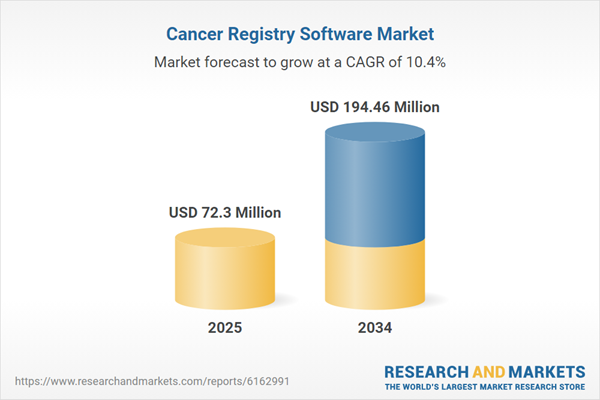Cancer Registry Software: Introduction
A cancer registry is an information system crafted to streamline the collection, processing, and management process of cancer-related data in patients. It plays a vital role in data surveillance as it helps identify the key areas for intervention to prevent the increasing incidence of cancer.Cancer registry software can help in treatment development for cancer. It can be a pivotal tool to identify potential risk factors of cancer like excessive sun or chemical exposure. The collected data can be further used for identifying locations where proper care and awareness are needed.
Global Cancer Registry Software Market Analysis
With the incidence of cancer cases and digitization trends, medical practitioners have started inclining towards software and digital platforms to streamline and organize vast amounts of data efficiently, contributing to improved patient outcomes Hence, the cancer registry software market demand has increased in the historic period.Registry Plus, developed by the Centers and Disease Control and Prevention, is an array of publicly available free software programs compliant with national standards. These programs implement the National Program of Cancer Registries (NPCR), established by Public Law 102-515. It has become a common platform among several cancer registries.
The cancer registry software market value is also expected to grow with the onset of software enabled with improved security features. For example, the latest iteration of Abstract Plus (version 6.0) includes security features like user roles, challenge questions and passwords. Additionally, all records are securely stored in Microsoft® Access, with an extra layer of protection through password encryption on all tables.
As this software offers a high degree of flexibility, it can also be customized by hospitals, clinics, laboratories, and other cancer data sources. This adaptability indicates a promising trajectory for the global market of cancer registry software in the forecast period.
Global Cancer Registry Software Market Segmentation
Cancer Registry Software Market Report and Forecast 2025-2034 offers a detailed analysis of the market based on the following segments:Market Breakup by Software Type
- Standalone
- Integrated
Market Breakup by Database
- Public Data
- Commercial Data
Market Breakup by Deployment Type
- Cloud-based
- On-Premises
Market Breakup by Functionality
- Cancer Reporting
- Patient Care
- Medical Research
Market Breakup by End User
- Government Organization
- Hospital and Medical Practices
- Research Centres and Private Payers
- Pharmaceutical, Biotechnology and Medical Device Companies
- Others
Market Breakup by Region
- North America
- Europe
- Asia Pacific
- Latin America
- Middle East and Africa
Global Cancer Registry Software Market Overview
As per the American Cancer Society Journal, in 2023 around 1,958,310 new cancer cases and 609,820 cancer deaths are estimated to occur in the United States only. Consequently, the United States is expected to dominate the cancer registry software market share. With the authorities getting more alert and proficient in spreading relevant information through awareness campaigns, the market size is anticipated to increase. In addition, the presence of a digital equipped infrastructure is also attributed to driving the market.The Asia Pacific is expected to lead the market, as the governments are getting informed and committed to constructing infrastructures aligned with technological advancements. The ongoing digitalization efforts across countries and a rising prevalence of telemedicine contribute to a significant surge in digital platforms and services. For instance, in India, the National Cancer Grid has installed the Koita Centre for Digital Oncology (KCDO). This centre promotes the application of digital technologies and tools to improve cancer care across the country. Such initiatives indicate that the cancer registry software market growth is certain in the future.
Global Cancer Registry Software Market: Competitor Landscape
The key features of the market report include patent analysis, grants analysis, clinical trials analysis, funding and investment analysis, partnerships, and collaborations analysis by the leading key players. The major companies in the market are as follows:- Centers for Disease Control and Prevention
- IBM Corporation
- Onco, Inc
- Elekta AB (pub)
- C/NET Solution
- Ordinal Data, Inc
- Conduent, Inc
- himagine solutions
- McKesson Corporation
- IACR Official Website
- F. Hoffmann-La Roche Ltd
- NeuralFrame, Inc
- IARC
This product will be delivered within 3-5 business days.
Table of Contents
Companies Mentioned
- Centers for Disease Control and Prevention
- IBM Corporation
- Onco, Inc
- Elekta AB (pub)
- C/NET Solution
- Ordinal Data, Inc
- Conduent, Inc
- himagine solutions
- McKesson Corporation
- IACR Official Website
- F. Hoffmann-La Roche Ltd
- NeuralFrame, Inc
- IARC
Table Information
| Report Attribute | Details |
|---|---|
| No. of Pages | 350 |
| Published | July 2025 |
| Forecast Period | 2025 - 2034 |
| Estimated Market Value ( USD | $ 72.3 Million |
| Forecasted Market Value ( USD | $ 194.46 Million |
| Compound Annual Growth Rate | 10.4% |
| Regions Covered | Global |
| No. of Companies Mentioned | 13 |








![Patient Registry Software Market by Disease (Diabetes, Cancer, Rare, Asthma, Kidney), Product (Drugs, Device), Use Case (Population Health, Research), End User [(Profit: Pharma, Payer, Hospital), (Non-Profit: Govt)] & Region - Global Forecast to 2030 - Product Image](http://www.researchandmarkets.com/product_images/12796/12796179_60px_jpg/patient_registry_software_market.jpg)
